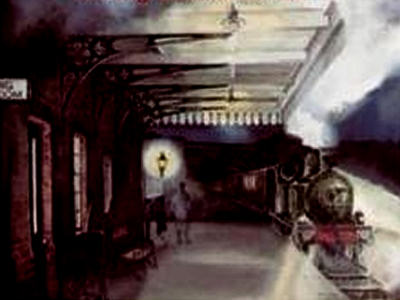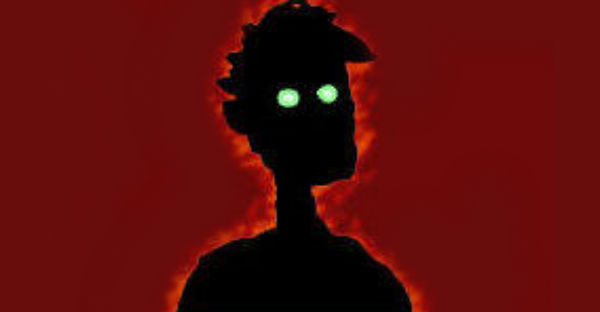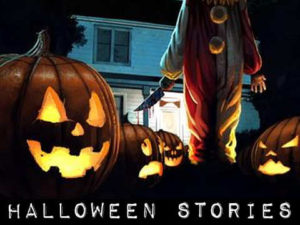Midnight Express is a classic scary tale by Alfred Noyes which was written in 1935. It tells the story of young boy is terrified by an illustration he finds in a book. The picture shows a man standing on an empty railway platform at night and the boy has no idea why it causes such intense feelings of fear. Years later, he finds himself in a dark railway station at night and spots a shadowy figure standing nearby.

Midnight Express is considered one of the best scary stories ever written and has appeared in a number of horror anthologies, including 65 Great Tales of the Supernatural and The 8th Fontana Book of Great Ghost Stories.
Midnight Express
It was a battered old book, bound in red buckram. He found it, when he was twelve years old, on an upper shelf in his father’s library; and, against all the rules, he took it to his bedroom to read by candlelight, when the rest of the rambling old Elizabethan house was flooded with darkness. That was how young Mortimer always thought of it. His own room was a little isolated cell, in which, with stolen candle ends, he could keep the surrounding darkness at bay, while everyone else had surrendered to sleep and allowed the outer night to come flooding in. By contrast with those unconscious ones, his elders, it made him feel intensely alive in every nerve and fibre of his young brain. The ticking of the grandfather clock in the hall below, the beating of his own heart; the long-drawn rhythmical ‘ah’ of the sea on the distant coast, all filled him with a sense of overwhelming mystery; and, as he read, the soft thud of a blinded moth, striking the wall above the candle, would make him start and listen like a creature of the woods at the sound of a cracking twig.
The battered old book had the strangest fascination for him though he never quite grasped the thread of the story. It was called The Midnight Express, and there was one illustration, on the fiftieth page, at which he could never bear to look. It frightened him.
Young Mortimer never understood the effect of that picture on him. He was an imaginative, but not a neurotic youngster; and he avoided the fiftieth page as he might have hurried past a dark corner on the stairs when he was six years old, or as the grown man on the lonely road, in The Ancient Mariner, who, having once looked round, walks on, and turns no more his head. There was nothing in the picture – apparently – to account for this haunting dread. Darkness, indeed, was almost its chief characteristic. It showed an empty railway platform – at night – lit by a single dreary lamp: an empty railway platform that suggested a deserted and lonely junction in some remote part of the country. There was only one figure on the platform: the dark figure of a man, standing almost directly under the lamp with his face turned away towards the black mouth of a tunnel which – for some strange reason – plunged the imagination of the child into a pit of horror. The man seemed to be listening. His attitude was tense, expectant, as though he were awaiting some fearful tragedy. There was nothing in the text, so far the child read, and could understand, to account for this waking nightmare. He could neither resist the fascination of the book, nor face that picture in the stillness and loneliness of the night. He pinned it down to the page facing it with two long pins, so that he should not come upon it by accident. Then he determined to read the whole story through. But, always, before he came to page fifty, he fell asleep; and the outlines of what he had read were blurred; and the next night he had to begin again; and again, before he came to the fiftieth page, he fell asleep.
He grew up, and forgot all about the book and the picture. But half way through his life, at that strange and critical time when Dante entered the dark wood, leaving the direct path behind him, he found himself, a little before midnight, waiting for a train at a lonely junction; and , as the station-clock began to strike twelve he remembered; remembered like a man awakening from a long dream –
There, under the single dreary lamp, on the long, glimmering platform, was the dark and solitary figure that he knew. Its face was turned away from him towards the black mouth of the tunnel. It seemed to be listening, tense, expectant, just as it had been thirty-eight years ago.
But he was not frightened now, as he had been in childhood. He would go up to that solitary figure, confront it, and see the face that had so long been hidden, so long averted from him. He would walk up quietly, and make some excuse for speaking to it: he would ask it, for instance, if the train was going to be late. It should be easy for a grown man to do this; but his hands were clenched, when he took the first step, as if he, too, were tense and expectant. Quietly, but with the old vague instincts awaking, he went towards the dark figure under the lamp, passed it, swung round abruptly to speak to it; and saw – without speaking, without being able to speak –
It was himself – staring back at himself – as in some mocking mirror, his own eyes alive in his own white face, looking into his own eyes, alive –
The nerves of his heart tingled as though their own electric currents would paralyse it. A wave of panic went through him. He turned, gasped, stumbled, broke into a blind run, out through the deserted and echoing ticket-office, on to the long moonlit road behind the station. The whole countryside seemed to be utterly deserted. The moonbeams flooded it with the loneliness of their own deserted satellite.
He paused for a moment, and heard, like the echo of his own footsteps, the stumbling run of something that followed over the wooden floor within the ticket-office. Then he abandoned himself shamelessly to his fear; and ran, sweating like a terrified beast, down the long white road between the two endless lines of ghostly poplars each answering another, into what seemed like a long straight canal, in which one of the lines of poplars was again endlessly reflected. He heard the footsteps echoing behind him. They seemed to be slowly, but steadily, gaining upon him. A quarter of a mile away, he saw a small white cottage by the roadside, a white cottage with two dark windows and a door that somehow suggested a human face. He thought to himself that, if he could reach it in time, he might find shelter and security – escape.
The thin implacable footsteps, echoing his own, were still some way off when he lurched, gasping, into the little porch; rattled the latch, thrust at the door, and found it locked against him. There was no bell or knocker. He pounded on the wood with his fists until his knuckles bled. The response was horribly slow. At last, he heard heavier footsteps within the cottage. Slowly they descended the creaking stair. Slowly the door was unlocked. A tall shadowy figure stood before him, holding a lighted candle, in such a way that he could see little either of the holder’s face or form; but to his dumb horror there seemed to be a cerecloth wrapped round the face.
No words passed between them. The figure beckoned him in; and, as he obeyed, it locked the door behind him. Then, beckoning him again, without a word, the figure went before him up the crooked stair, with the ghostly candle casting huge and grotesque shadows on the whitewashed walls and ceiling.
They entered an upper room, in which there was a bright fire burning, with an armchair on either side of it, and a small oak table, on which there lay a battered old book, bound in dark red buckram. It seemed as though the guest had been long expected and all things were prepared.
The figure pointed to one of the armchairs, placed the candlestick on the table by the book (for there was no other light but that of the fire) and withdrew without a word, locking the door behind him.
Mortimer looked at the candlestick. It seemed familiar. The smell of the guttering wax brought back the little room in the old Elizabethan house. He picked up the book with trembling fingers. He recognised it at once, though he had long forgotten everything about the story. He remembered the ink stain on the title page; and then, with a shock of recollection, he came on the fiftieth page, which he had pinned down in childhood. The pins were still there. He touched them again – the very pins which his trembling childish fingers had used so long ago.
He turned back to the beginning. He was determined to read the end now, and discover what it was all about. He felt that it must all be set down there, in print; and, though in childhood he could not understand it, he would be able to fathom it now.
It was call The Midnight Express; and, as he read the first paragraph, it began to dawn upon him slowly, fearfully, inevitably.
It was the story of a man who, in childhood, long ago, had chanced upon a book, in which there was a picture that frightened him. He had grown up and forgotten it and one night, upon a lonely railway platform, he had found himself in the remembered scene of the picture: he had confronted the solitary figure under the lamp: recognised it, and fled in panic. He had taken shelter in a wayside cottage: had been led to an upper room, found the book awaiting him and had begun to read it right through, to the very end, at last – And this book too was called The Mignight Express. And it was the story of a man who, in childhood – It would go on thus, forever and forever, and forever. There was no escape.
But when the story came to the wayside cottage, for the third time, a deeper suspicion began to dawn upon him, slowly, fearfully, inevitably – Although there was no escape, he could at least try to grasp more clearly the details of the strange circle, the fearful wheel, in which he was moving.
There was nothing new about the details. They had been there all the time; but he had not grasped their significance. That was all. The strange and dreadful being that had led him up the crooked stair – who and what was That?
The story mentioned something that had escaped him. The strange host, who had given him shelter, was about his own height. Could it be that he also – And was this why the face was hidden?
At the very moment when he asked himself that question he heard the click of the key in the locked door.
The strange host was entering – moving toward him from behind – casting a grotesque shadow, larger than human, on the white walls in the guttering candlelight.
It was there, seated on the other side of the fire, facing him. With a horrible nonchalance, as a woman might prepare to remove a veil, it raised it hands to unwind the cerecloth from its face. He knew to whom it would belong. But would it dead or living?
There was no way out but one. As Mortimer plunged forward and seized the tormentor by the throat, his own throat was gripped with the same brutal force. The echoes of their strangled cry were indistinguishable; and when the last confused sounds died out together, the stillness of the room was so deep that you might have heard – the ticking of the old grandfather clock, and the long-drawn rhythmical ‘ah’ of the sea, on a distant coast, thirty-eight years ago.
But Mortimer had escaped at last. Perhaps, after all he had caught the midnight express.
It was a battered old book, bound in red buckram…







I dont get the story…
This story reminds me of Strange Photos.
Sfk rocks. And this story is really really great. Bloody Mary go back to your mirror ’till some idiot teen dude calls you out or something.
scary… I love scary stories! :D
@bloodymary u got mental issues or somthin? The story actually is scary so just like Ahmed said go back to your stupid little mirror
Oh! What a long story. Hate reading long stories who have a boring introduction.
Thank you for the story sfk. It gave off a kaleidoscopic feel and its more creepy than scary.
@bloody mary that was so not cool. Couldnt u have just said, ‘I hate this story. ‘ and shut up? U don’t have to cuss even if you are entitled to your own opinion. Anyway, I love this story. I kept looking over my shoulder expecting another me to appear while reading it. U rock SFK
Everyone’s entitled to their own opinions about this story but I for one thought this was a great story. I mean if you think about it, he’s just in a never-ending story about himself. I honestly don’t get why people hate this story. I’ve worse stories on this site. Does anyone remember the story about the wife whose husband was a war vet that lost his hand in a war then she realized that her husband died when he was three years old and she was at the wedding by herself? This story has mystery and fear.
Ya bloody mary go back to ya stupid mirror.you rock sfk!keep up the good stories.
@eerie if the parents let her on the web with ou them watching then its there fault yet she really shouldnt cuss theres no reason to
i agree with both (happenstance and Gidgey) yes some stories may seem ‘stupid’ but you dont have to cuss about it? if you dont like something write it down. in your journal or diary. but DONT post it on the web??? if a 5 yr old , went on this site aftering reading this, and saw YOU(bloody mary) write something, inappropriate, the parents will or would wind up ‘sueing’ ‘SFK’ .just because YOU wrote somthing on HERE that they (child’s parents) didnt like or agree with?! so please keep it APPROPRIATE!
@Gidgey well she entitled to her oppion BUT@ bloody marry you shouldnt cuss little kids come on here and it could be he hasnt been in his house for years and it was night and he was scared
@bloody mary what is your problem?! why are you trying to ruin everyone elses enjoyment?! And its not SFK’s fault that you are not capable of reading a good story so go away!
creeeeeepy
STUPID
how the kid cannot recognize his own house nd how can someone read his future in a book
this is all stupid
not a bit scary
You’d Better Not Cry
Have you ever wondered why the song Santa Claus is coming to town has the line: You’d better watch out, you’d better not cry you’d better not cry, you’d better not pout I’m telling you why, Santa Claus is coming to town? Could this have an even deeper meaning and not just be a line to a song about the kind, jolly, fat man we all know and love???? Well in reality Santa Claus goes to children’s houses and beats them up. It doesn’t really matter to him wether it is a boy or a girl. That’s the you’d better watch out part. He does this because he is tired about giving toys to boys and girls all in one night and is tired of always being the good one while to him black Peter, Hanns Trapp, and krampus get all the fun beating all the children in a bloody pulp. The reason that the parents don’t know about this is because of the two lines you’d better not cry, you’d better not pout. While Santa is hurting the innocent children he threatens to hurt them even more if they start to cry. So that way the parents don’t hear their children cry. Then if the children early in the morning on Christmas wake up their parents and tell them about what Santa did to them, it is pretty obvious that they won’t believe them so they would start pouting and guess who says not to pout? So Santa is not all he means because soon Santa Claus is coming to town and he will find out that you read this and now know his secret. He will find you. How do I know this well I’m one of Santa’s Elfs, his most trusted one. So happy holidays!!!!
I know that it is a Christmas story but can you look at it and if you like it can you post it as a story?
^_^